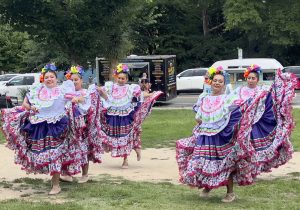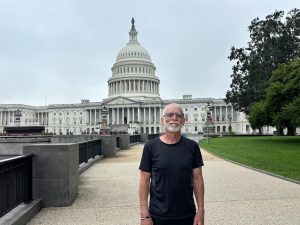Under a banner declaring “everyone welcome,” a small group of Durhamites gather in the winter cold. The yard in front of the Durham Co-op is a sea of colorful wool hats and scarfs. Two big black dogs near the parking lot serve as the greeting committee, while parents shepherd their bundled-up kids, reusable tote bags in tow.
“I would love to grow spinach, it just doesn’t work for me,” says a woman in a flowing green skirt, as she examines the table for her perfect seed fit.
This is the Durham Co-op’s Seed Swap, where different gardening-focused groups in Durham flaunt a variety of seeds for the taking—everything from sunflowers to pumpkin seeds to whole garlic bulbs. In exchange, amateur local gardeners donate seeds from their own collections.
A small group huddles around a woman in a brown suede coat named Jennifer, animatedly discussing a certain seed she’s brought—Jimmy Nardello, an Italian variety of sweet pepper. Jennifer generously divulges the secret of growing the vegetable: patience, at least until the plants fully ripen. “They’re good green, but they’re really good red.”
For people looking for more than Jimmy Nardello, the next picnic table offers a diverse assortment of crops such as squash, cilantro, and broccoli. All this bounty is thanks to the Digging Durham Seed Library, Durham County Library’s seed borrowing initiative, which celebrates its 10th anniversary this year. The program offers a repository of seeds for “borrowing”—no library card required.

The repository is stocked seasonally, and spring seeds, which have just come in, are available to patrons starting in mid-February. Think hearty vegetables that can survive some winter frost, like carrots, kale, and radishes. During the rest of the growing season—February to October—the seed library offers other crops like flowers and herbs, while supplies last. Librarian Jess Epsten shares a detailed harvest schedule for different seeds throughout the year, compiled based on “hundreds and hundreds of years of knowledge” about the local climate.
A nearby sign directs people to the seed swap’s resident experts: “Ask a Master Gardener.” The Master Gardeners, part of a program run by NC State Extension, are required to undergo a rigorous botany training process to earn their title.
“I get a little intimidated because I think, ‘There’s no way I’m going to remember all of this’,” admits Lina Davison, a Master Gardener intern dressed in head-to-toe marigold yellow. “But it’s a community of people who want to guide you. It’s a community of people who enjoy plants!” Kat Causey, a certified Master Gardener of 18 years, nods along. “I come to these events and I learn. I will learn from her, she will learn from me.”

Keep Durham Beautiful, an affiliate of Keep America Beautiful, is situated by the exit. Wildflower seed mix packets are scattered across the table, and group representative Dawn Keyser recommends sowing the seeds now. The winter cold actually benefits many wildflowers, she explains, ensuring that they’ll bloom beautifully in the summertime.
As people share the perfect ratio of water and sunlight for growth, or murmur excitedly when they find the seed they’ve been looking for, Master Gardener Kat looks on with pride. “This is a true community gem. It engages the public as well as gardening experts. You can’t ask for more.”
Editor’s note: While seeds are arriving now at the Durham County Library, they are not available to library patrons until mid-February. The story has been updated to reflect that fact.
Pictured above (from top): Seeds on offer from the Digging Durham Seed Library; Raafe Purnsley, community outreach coordinator for the Durham Co-op Market, chats with Seed Swap visitor Ginger Miley; visitors swap seeds at the recent Co-op event. Photos by Abigail Bromberger — The 9th Street Journal






